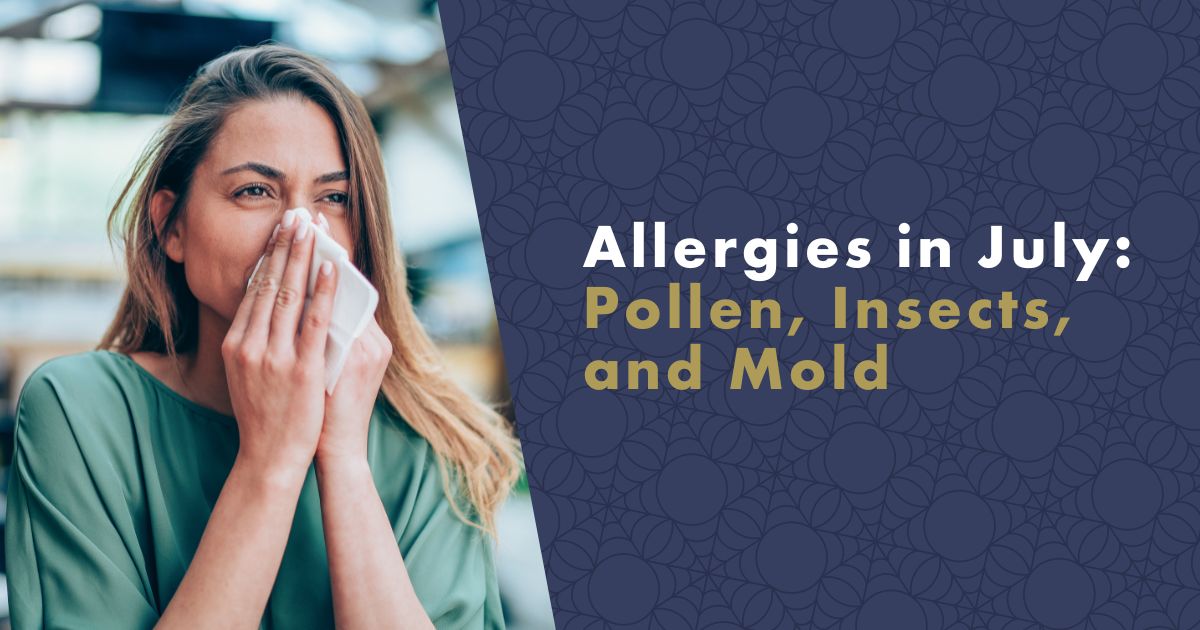July is a month of joy, sunshine, and vacations. Unfortunately, for many people, it is also a month when their allergies are in full swing. If you're one of those who suffer from allergies in July, you're not alone. In this article, you will learn about the symptoms of allergies, the most common allergens in July, and how to protect yourself from them.

How Allergies Develop
Allergies occur when the immune system overreacts to substances that are harmless to most people. When an allergen enters the body of an allergic individual, the immune system reacts by producing antibodies that cause allergic symptoms. Allergies can manifest in various ways, from itching and sneezing to severe anaphylactic reactions.
Symptoms of Allergies
There are many symptoms that depend on individual allergies. Common allergy symptoms include:
- Itchy eyes
- Sneezing
- Runny nose
- Irritated eyes
- Shortness of breath
Specific Allergic Symptoms in July
Since July is the month when many herbs and grasses bloom, the most common allergic reactions are caused by pollen. Pollen is most commonly spread through the air, so allergy sufferers primarily experience respiratory difficulties. With flowering plants, there is also increased insect activity, which can lead to allergies from insect bites.
Most Common Allergens in July
In July, several allergens are common triggers of allergic reactions. The most common allergens in July are mainly grass and cereal pollen, dust mites, molds, and insects.
- Pollen Allergy: In July, many herbs and grasses bloom. Pollen from various plants is released into the air and can trigger allergic reactions in sensitive individuals. Among trees, black elderberry and linden primarily cause allergic reactions. Among herbs and grasses, it is commonly artemisian, chamomile, plantago, sorrel, ragweed, dandelion, nettle, meadow grasses, and amaranth, and among cereals, corn, rye, and others release the most pollen.
TIP: How to Fight Pollen Allergy in Spring
Insect Bites: Insects, such as bees and wasps, are most active in July, and more frequent bites can cause allergic reactions. Insect bites can cause itching, swelling, and shortness of breath.
- Dust Mite Allergy: In humid and warm weather in July, dust mites multiply and can trigger allergic reactions in susceptible individuals. Dust mites can bother allergy sufferers throughout the year, especially with symptoms such as runny nose, itching, and breathing difficulties.
- Molds: If there is moisture in the air from summer rains, there is a higher amount of mold spores in the air, for which warmth and humidity are ideal conditions for reproduction. Mold allergies bother many people during the warm months, and symptoms include coughing, shortness of breath, or itchy skin.
How to Protect Yourself from Allergies in July
Prevention plays an important role in minimizing allergic reactions during July.
- Limit contact with allergens: The first step you can take to avoid allergic reactions is to minimize contact with allergens, especially at home or in environments where you spend the most time. If you plan to go outside or into nature, have a face mask, scarf, or personal air purifier with you to clean the air in your immediate vicinity.
- Get rid of allergens in your home: Whether you suffer from pollen, dust mites, dust, or molds, air purifiers and air dehumidifiers are great helpers to reduce the number of dust mites as well. Also, pay attention to cleanliness. Dust and mop more frequently, don't keep moldy food at home, and use proper cleaning products.
- Monitor pollen forecasts: Monitoring the pollen situation in your area can help you plan your activities. If allergen concentrations are high, it is advisable to limit outdoor activities and stay in well-ventilated rooms. Avoiding outdoor chores such as mowing the lawn or working with soil can also help minimize exposure to allergens.
#produkty#https://www.nanospace.store/designer-washable-nano-masks/
Learn More About Allergies:
FAQ
1. How long does allergy immunotherapy take?
Allergy immunotherapy can last from several months to several years, depending on the specific case. The treatment plan is determined by the doctor.
2. Can allergies in July cause serious complications?
Yes, allergies in July can cause serious complications, especially in individuals with pronounced allergic reactions. It is important to consult with a specialist if severe symptoms occur.
3. What is the difference between an allergy and a cold?
Allergies and colds have similar symptoms, such as sneezing and a runny nose. However, allergies often manifest with itchy eyes and recurring symptoms during specific periods, while a cold usually lasts for a shorter duration.
4. How can I minimize exposure to allergens in my home?
Regularly vacuuming the house, maintaining low humidity, using allergen-proof furniture covers, and limiting contact with pets can help minimize exposure to allergens.
5. Is there a cure for allergies that completely eliminates them?
Currently, there is no cure for allergies that completely eliminates allergic reactions. Treatment focuses on alleviating symptoms and controlling allergic reactions through symptomatic therapy and immunotherapy.
6. What type of air purifier is most effective for removing pollen from the home?
The most effective type of air purifier for removing pollen from the home is one that has a HEPA filter. HEPA filters capture very small particles, including pollen and allergens, as small as 0.3 micrometers.
7. How often should I change the filters in an air purifier?
Generally, it is recommended to change the filters in an air purifier according to the manufacturer's instructions. Usually, filters should be replaced every 6 to 12 months or when visibly dirty. Regular filter replacement ensures optimal efficiency of the purifier.
Sources
- Janíčková, M.H., 2009. Alergie na roztoče a plísně. Pediatr. pro Praxi, 10(3), pp.163-166.
- Vydláková, M.J., 2010. Inhalační alergeny a spouštěče alergických onemocnění. Interní medicína pro praxi, 12(2), pp.101-103.
- Šerá, B., 2014. Pylové alergie–negativní vliv dřevin ve městech. Životné prostredie, 48(2).
- Bruker, M.M., 2000. Jak se zbavit alergie.

